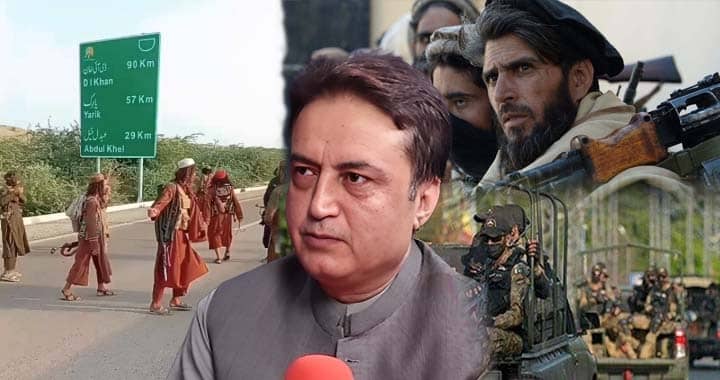Arif Yousafzai
The security situation in Khyber Pakhtunkhwa today is alarming, complex, and steadily worsening. It would be misleading to suggest that this province enjoys peace. On the contrary, Pakhtunkhwa has become an aggressive and volatile region where law and order is collapsing, and the writ of the state is openly challenged by militant groups.
From the southern districts Kohat, Karak, Laki Marwat, and Hangu stretching up to Dera Ismail Khan, a grim picture emerges. These districts, once fragile but manageable, are now mired in insecurity. The return of the Taliban and affiliated groups over the past four years has deepened the crisis. Their resettlement in these areas marked the beginning of a steady decline. Today, they openly operate checkpoints on district routes, motorways, and even the CPEC corridor, as if to declare their permanent presence. The Hakla–Dera Ismail Khan motorway, a vital national artery, has witnessed Taliban checkpoints similar to those once operated by the police.
This is not a symbolic gesture; it is a show of strength. The militants are saying: “We are here with full force, settled in these lands, and capable of striking anywhere at will.” Whether by blocking highways, targeting convoys, or attacking compounds, they are asserting their dominance. Groups like the Hafiz Gul Bahadur faction have not only revived themselves but also gained significant mileage and strength, turning the province into a battleground.
On the other side stand Pakistan’s security forces. Intelligence-based operations are carried out regularly. Just recently, an operation in Dera Ismail Khan’s Terawan tehsil claimed the lives of several militants. Yet, despite these efforts, the reality remains stark: militant violence and state responses have locked Pakhtunkhwa into a cycle of conflict. For ordinary citizens, life has become more difficult with each passing day. For the state, the challenge grows heavier.
Some argue that these groups thrive solely because of external proxies. It is true that Pakistan’s enemies, particularly India, would never wish to see peace and prosperity here. India has historically sought to destabilise Pakistan, and its hand cannot be dismissed. Yet the problem cannot be reduced only to foreign sponsorship. Militancy in Pakistan has a history spanning over two decades. These groups did not emerge overnight; they have deep roots. Therefore, while questions of foreign support remain relevant, the immediate focus must be on those visibly fighting and destabilizing on the ground.
Beyond the physical battleground lies another dangerous front: the narrative war. Digital platforms are flooded with fake news, manipulated images, and AI-generated propaganda that confuses the public and distorts perceptions. Lies travel faster than truth, and in Pakistan, where society has grown accustomed to propaganda, disinformation resonates strongly. The responsibility to counter this lies with the state and its institutions. But instead of indulging in falsehood, the state must adopt seriousness both in peace talks and in military responses while developing robust strategies to neutralize hostile narratives.
At the heart of this crisis lies a pressing question: should Pakistan continue to rely on operations alone, or should it prioritise dialogue? The government of Chief Minister Sardar Ali Amin Gandapur has repeatedly voiced its willingness to seek negotiations with the Afghan Taliban in Kabul. If the provincial government genuinely believes peace can be achieved by engaging the Afghan Taliban leadership, then it should act decisively. Empty announcements and delays such as citing travel document issues serve no purpose. If dialogue is the road to peace, then the first step must be taken without hesitation.
The conflict has already bled Pakhtunkhwa and Balochistan for over two decades. Economies have collapsed, businesses have withered, and per capita incomes have plunged. The people of these provinces have endured unending violence while Pakistan as a whole has suffered. Every life lost whether a soldier of the Pakistan Army or a militant is ultimately Pakistan’s loss. This cycle must end.
Peace is not an abstract concept; it is a necessity for survival. If dialogue can achieve what operations cannot, then dialogue must be pursued. Negotiations, however difficult, are preferable to perpetual war. The responsibility now rests on both provincial and federal leadership to act with urgency and vision.
For Pakhtunkhwa and Balochistan, peace is not merely a desire—it is the only path forward.





